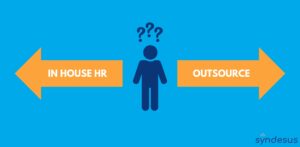When US companies expand into Canada, HR strategy is critical to success. A key decision is whether to manage HR functions in-house or partner with a Professional Employer Organization (PEO). This article explores the pros and cons of each approach, including taxes, payroll, and employment law.
What is a PEO?
A Professional Employer Organization (PEO) offers HR services like payroll management, benefits administration, and risk management. In a co-employment relationship, the PEO handles HR duties while the company retains operational control, unlike an HR outsourcing company that manages specific HR functions without entering a co-employment model. By partnering with a PEO, businesses can reduce overhead, improve compliance, and offer better benefits to employees.
A Professional Employer Organization (PEO) provides comprehensive HR services to small and medium-sized businesses. PEOs share certain responsibilities and liabilities with the client company.
The primary role of a PEO is to manage HR functions such as payroll, benefits administration, compliance, and risk management. This allows business owners to focus on their core operations without the burden of handling complex HR tasks. By leveraging the expertise of a PEO, companies can ensure efficient and compliant HR practices, ultimately contributing to their overall success.
What is an In-House HR Team?
An in-house HR team, or in-house HR department, manages recruitment, payroll, benefits, and compliance directly within the company. For small and medium-sized businesses, the internal HR department may lack sufficient resources, making it challenging to stay compliant with local laws. This is more common for larger companies that want more control over HR practices but can be resource-intensive. For small businesses, it may be challenging to stay compliant with local laws, especially in a new market like Canada.
Key Considerations for US Companies Expanding to Canada
When expanding into Canada, US companies must carefully evaluate their HR options. The primary factors to consider include:
Many business owners are deliberating on whether to use a PEO or manage HR functions in-house when expanding into new markets like Canada.
Hiring
- In-House HR: Managing hiring internally allows full control over recruitment but requires familiarity with Canadian labor practices and talent markets.
- PEO: A PEO simplifies hiring by managing recruitment and onboarding, offering HR outsourcing services that can be tailored to specific business needs. Their local expertise can help businesses find the right talent quickly.
Taxes
- In-House HR: Handling taxes in-house requires expertise in Canadian tax laws. While this gives full control, staying updated on tax regulations can be complex.
- PEO: PEOs handle payroll taxes, withholdings, and remittances, ensuring compliance with Canadian tax laws and reducing the risk of errors.
Payroll and Employee Benefits
- In-House HR: While managing payroll internally offers control, Canadian payroll regulations differ from US laws, requiring specialized knowledge.
- PEO: A PEO can manage payroll, benefits, and compliance, ensuring adherence to Canadian laws and reducing administrative burdens.
Employment Laws
- In-House HR: Canadian employment laws are complex, and an in-house team needs continuous training to ensure compliance.
- PEO: A PEO keeps businesses compliant with Canadian labor laws and manages contract disputes, reducing legal risks for US companies.
How PEOs Work
PEOs operate by establishing a co-employment relationship with the client company. In this arrangement, the PEO becomes the employer of record for tax purposes, taking on responsibilities such as collecting and remitting payroll taxes and providing employee benefits. Meanwhile, the client company retains control over day-to-day operations, including employee supervision and management. This division of responsibilities allows businesses to benefit from the PEO’s expertise in HR management while maintaining control over their workforce. Typically, PEOs charge a fee per employee, which can vary based on the services provided and the size of the client company.
PEO Services and HR Functions
PEOs offer a wide range of HR services designed to streamline and enhance business operations. These services include:
Payroll Management: PEOs handle all aspects of payroll processing, including managing payroll taxes and providing detailed payroll reports.
Benefits Administration: PEOs manage employee benefits such as health insurance, retirement plans, and workers’ compensation, ensuring that employees receive comprehensive and competitive benefits packages.
Compliance: PEOs ensure that businesses comply with federal, state, and local laws and regulations, reducing the risk of legal issues.
Risk Management: PEOs manage workers’ compensation claims, workplace safety, and OSHA compliance, helping to create a safer work environment.
HR Consulting: PEOs provide expert guidance on HR-related issues, including employee relations, performance management, and recruitment strategies.
By offering these comprehensive HR services, PEOs enable businesses to operate more efficiently and effectively.
Comparison to HR Outsourcing (HRO)
While both PEOs and HR Outsourcing (HRO) companies provide HR services, there are key differences between the two. HROs typically offer a la carte services, allowing clients to choose specific HR functions to outsource. This can be beneficial for businesses that only need assistance with certain aspects of HR.
In contrast, PEOs provide comprehensive HR services, including payroll, benefits administration, and compliance. This means that PEOs share certain responsibilities and liabilities with the client company, offering a more integrated approach to HR management. For businesses seeking a holistic solution to their HR needs, PEOs can be a more advantageous option.
Pros and Cons of In-House HR vs. PEO
In-House HR:
- Pros: Greater control over HR practices, alignment with company culture, and direct management of processes.
- Cons: Requires significant resources and expertise to stay compliant with Canadian laws, which may be challenging for new businesses. Small and medium-sized businesses often find that their internal HR department lacks the resources and expertise needed to stay compliant with Canadian laws.
PEO:
- Pros: Provides expert management of HR, payroll, and compliance. Reduces administrative burdens and ensures legal compliance.
- Cons: Less control over HR processes, and service costs need to be factored into the budget.
Benefits of Outsourcing HR to a Professional Employer Organization
A major advantage of partnering with a PEO is access to better benefits and resources. HR outsourcing services provided by PEOs allow businesses to delegate HR functions such as payroll, benefits administration, and compliance management. PEOs can negotiate lower benefits costs and provide comprehensive packages, allowing small businesses to compete with larger firms for top talent. PEOs also manage payroll and tax complexities, freeing businesses to focus on growth.
Choosing the Right PEO
When selecting a PEO, business owners should consider several important factors:
Experience: Look for a PEO with a proven track record and experience working with businesses in your industry. This ensures they understand the unique challenges and requirements of your sector.
Services: Ensure the PEO offers the HR services you need, such as payroll management, benefits administration, and compliance support. A comprehensive service package can provide greater value.
Cost: Compare the costs of different PEOs, taking into account the fee per employee and any additional services. It’s important to find a PEO that fits within your budget while still meeting your needs.
Reputation: Research the PEO’s reputation by reading reviews and asking for references. A reputable PEO with positive feedback from clients is more likely to provide reliable and effective services.
By carefully evaluating these factors, business owners can choose a PEO that aligns with their needs and goals.
Common Industries that Use PEOs
PEOs are widely used across various industries due to their ability to provide comprehensive HR services. Some common industries that benefit from PEO services include:
- Small Businesses: PEOs offer small business owners access to comprehensive HR services, allowing them to focus on their core operations and growth.
- Restaurants and Hospitality: PEOs help manage payroll, benefits, and compliance for restaurants and hospitality businesses, ensuring smooth and efficient operations.
- Healthcare: PEOs provide HR services, including payroll management and benefits administration, for healthcare providers, helping them manage their workforce effectively.
- Technology: PEOs assist tech companies in managing HR functions such as payroll, benefits, and compliance, enabling them to attract and retain top talent in a competitive industry.
By leveraging the expertise of PEOs, businesses in these industries can streamline their HR processes and focus on their primary objectives.
Conclusion
Choosing between in-house HR and a PEO depends on your company’s specific needs and resources. In-house HR offers more control but requires a significant investment, while a PEO provides expert HR management, legal compliance, and cost savings. For many startups, partnering with a Canadian PEO offers efficiency, risk management, and access to top talent, making it an attractive option for US companies expanding into Canada.
If you’re considering partnering with a PEO to streamline your HR processes and ensure compliance in Canada, Syndesus is here to help. Reach out to us for a free consultation and learn how we can support your business as you expand into the Canadian market.


